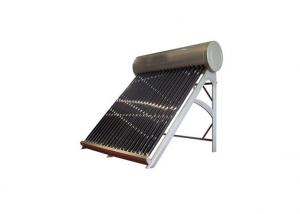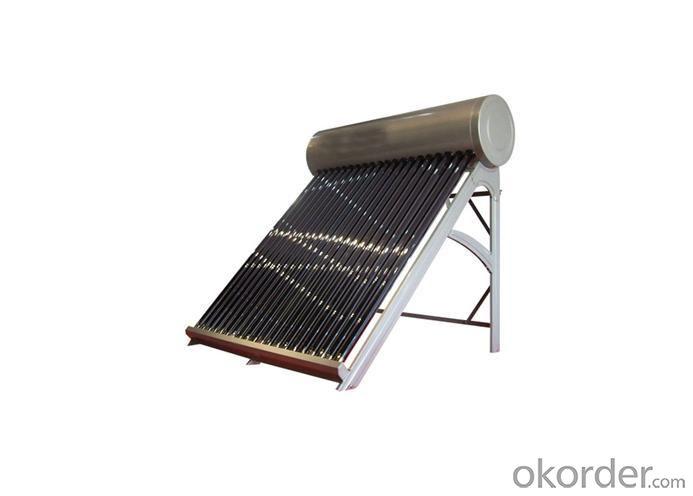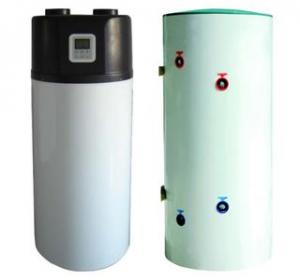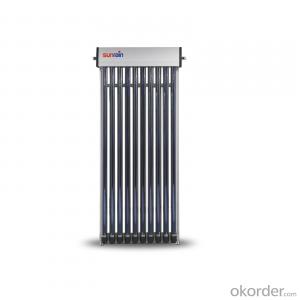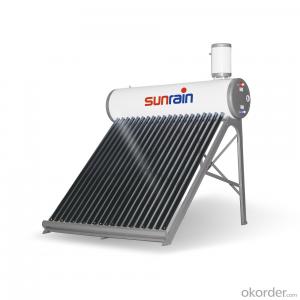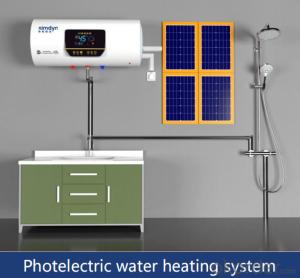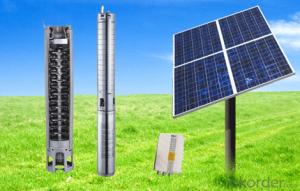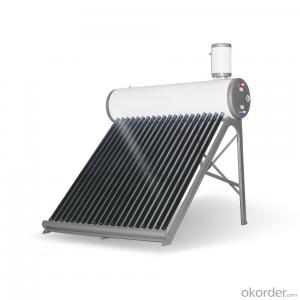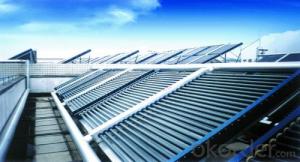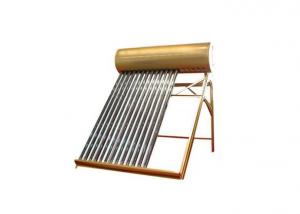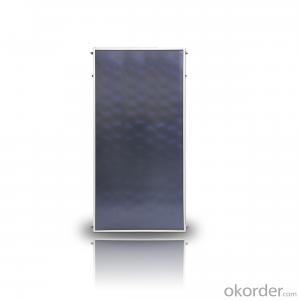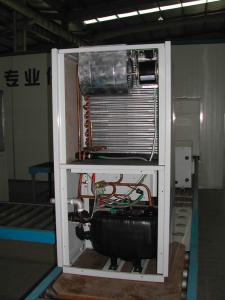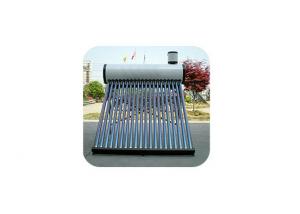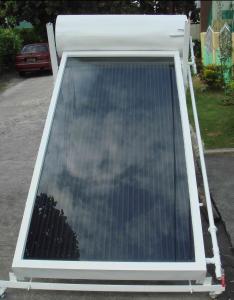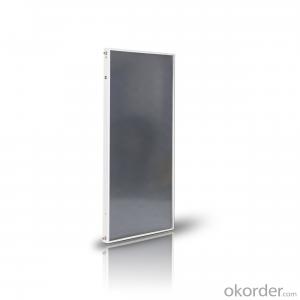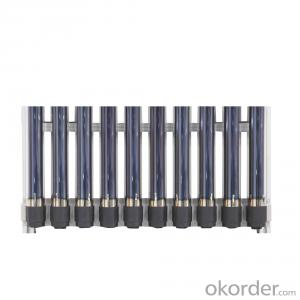Fpc Solar Water Heater 2012 New Solar Hot Water Heater in Home Appliances
- Loading Port:
- China Main Port
- Payment Terms:
- TT or LC
- Min Order Qty:
- 1 Set set
- Supply Capability:
- 3000 Sets per Month set/month
OKorder Service Pledge
OKorder Financial Service
You Might Also Like
*ISO9001,ISO14001,RoHS,CCC,CE
*15 years life at least
Vacuum tubes use highborosilicate glass double-tube co-axial and adapt optical interfernece gradual change of SS-C/CU coating tevhnology. (STRUCTURE: Glass/CU/SS-ALN(H)/SS-ALN(L)/ALN). Through the interlayer, vacuum has an unique effect of thermo, with its temperature up to 400 degree of idle sunning, performing a strong heating abilitty.
| Material |
Outer tank:
PVDF / Colored galvanized steel plate / SUS 304-2B stainless steel / Wiredrawing plate |
Inner tank:
SUS304-2B stainless steel with CNC processing and Aotomatic argon-arc welding | |
Insulation:
50/55mm PUF with one-time filling&shaping technology to the density of 35~40kg/m3 | |
Frame:
Colored galvanized steel plate / Aluminium alloy / SUS 304-2B stainless steel |
| Features | Higher efficiency |
| Simple configuration | |
| Silicon rings to connect and seal them | |
| Automatic controllers can be applied to these systems or with an assist tank | |
| Electrical heating element | Mg bar is optional |
- Q: Can a solar water heater be used with a water softener system?
- Yes, a solar water heater can be used with a water softener system. The water softener system helps remove minerals that can cause scale buildup, which is beneficial for the solar water heater's efficiency and longevity.
- Q: How does a solar water heater impact the aesthetics of a property?
- A solar water heater can have a positive impact on the aesthetics of a property by reducing the need for large conventional water heating systems, such as bulky water tanks or boilers. Solar water heaters are typically more compact and can be integrated into the architecture of a building more easily. Their sleek and modern design can also enhance the overall appearance of a property, contributing to a more environmentally-friendly and visually appealing aesthetic.
- Q: How does the location of a solar water heater affect its performance?
- The location of a solar water heater can significantly impact its performance. Ideally, the heater should be installed in a spot that receives maximum sunlight exposure throughout the day. If the heater is placed in a shaded area or an area with limited sunlight, it will not be able to efficiently absorb solar energy, leading to reduced performance. Additionally, the orientation and tilt of the solar collector should be carefully considered to optimize its exposure to the sun.
- Q: Solar water heater is not hot how to do
- Solar energy is not hot, then there are several reasons for you to look at the sunshine time is short; A water heater in front of a shelter. B water valve off lax; vacuum tube memory scale heat collecting efficiency is reduced to C; the water quality is not good. E local air pollution is serious. The influence of heat collection; vacuum tube surface dust.F water tank all run out. Water tank capacity is small, that is, there is no basic water temperature. Large water consumption; G affected by weather. Troubleshooting: A for shelter or solar shift; B replacing C cleaning vacuum tube water valve; D; the vacuum tube surface clean; E replacement of large capacity water heater with electric heating system; pay attention to water heater water F analysis of weather conditions.
- Q: How does the maintenance cost of a solar water heater compare to a traditional water heating system?
- The maintenance cost of a solar water heater is generally lower compared to a traditional water heating system. Solar water heaters have fewer components and moving parts, which reduces the likelihood of mechanical failures and the need for regular maintenance. Additionally, solar water heaters do not require the use of gas or electricity, resulting in lower energy costs and fewer expenses for repairs or replacements. However, occasional maintenance tasks such as cleaning the solar panels and inspecting the system may be necessary to ensure optimal performance and longevity. Overall, the maintenance cost of a solar water heater is typically more cost-effective than that of a traditional water heating system.
- Q: Can a solar water heater be used in cold climates?
- Yes, a solar water heater can be used in cold climates. While colder temperatures may affect the efficiency of a solar water heater, modern systems are designed to withstand and operate efficiently even in cold weather. Additionally, advancements in technology, such as insulated storage tanks and freeze protection mechanisms, have made solar water heaters suitable for use in cold climates.
- Q: What is the cost of installing a solar water heater?
- The price of setting up a solar water heater can differ based on several factors, such as the system's size and type, the installation's location, and any necessary additional equipment or accessories. Typically, the expense of a solar water heater installation can range from $2,000 to $7,000. This covers the cost of the solar panels, the water storage tank, the plumbing and installation labor, and any required permits. It's important to acknowledge that although the initial cost of installing a solar water heater may appear steep, it can result in significant long-term savings on energy bills. Solar water heaters are extremely efficient and can reduce water heating expenses by 50-80% compared to conventional electric or gas-powered water heaters. Furthermore, there might be potential incentives or tax credits offered at the local, state, or federal level that can help offset the installation cost. It is advisable to conduct research and seek advice from local solar energy providers or government agencies to explore any available financial incentives. All in all, the price of installing a solar water heater can differ, but it is a worthy investment that can provide both financial savings and environmental advantages in the long term.
- Q: What is the required maintenance frequency for a solar water heater?
- The required maintenance frequency for a solar water heater typically depends on its specific make and model, as well as the local climate and water quality. However, in general, it is recommended to have a professional inspection and maintenance check at least once a year to ensure optimal performance and longevity of the system. Regular cleaning of panels, checking for leaks, verifying proper fluid levels, and testing the overall functionality are some of the key maintenance tasks that should be performed regularly.
- Q: Can a solar water heater be used in areas with limited space for installation?
- Yes, a solar water heater can be used in areas with limited space for installation. There are compact and space-efficient solar water heater systems available that can be installed on rooftops or in small areas. Additionally, some models come with versatile mounting options to accommodate limited space requirements.
- Q: Are there any safety concerns associated with a solar water heater?
- Yes, there are a few safety concerns associated with a solar water heater. These concerns include the risk of overheating, which can lead to scalding water or even explosion if not properly regulated. Additionally, the system requires proper insulation and protection against freezing temperatures to prevent damage to the solar panels or pipes. It is also important to regularly maintain and inspect the system to ensure safe and efficient operation.
1. Manufacturer Overview
| Location | Zhejiang,China (Mainland) |
| Year Established | 2004 |
| Annual Output Value | US$10 Million - US$50 Million |
| Main Markets | North America; South America; Southeast Asia; Africa; Oceania; Mid East; Western Europe |
| Company Certifications | ISO 9001:2000 |
2. Manufacturer Certificates
| a) Certification Name | |
| Range | |
| Reference | |
| Validity Period |
3. Manufacturer Capability
| a) Trade Capacity | |
| Nearest Port | |
| Export Percentage | 61% - 70% |
| No.of Employees in Trade Department | |
| Language Spoken: | |
| b) Factory Information | |
| Factory Size: | 5,000-10,000 square meters |
| No. of Production Lines | 8 |
| Contract Manufacturing | OEM Service Offered |
| Product Price Range | |
Send your message to us
Fpc Solar Water Heater 2012 New Solar Hot Water Heater in Home Appliances
- Loading Port:
- China Main Port
- Payment Terms:
- TT or LC
- Min Order Qty:
- 1 Set set
- Supply Capability:
- 3000 Sets per Month set/month
OKorder Service Pledge
OKorder Financial Service
Similar products
Hot products
Hot Searches
Related keywords
